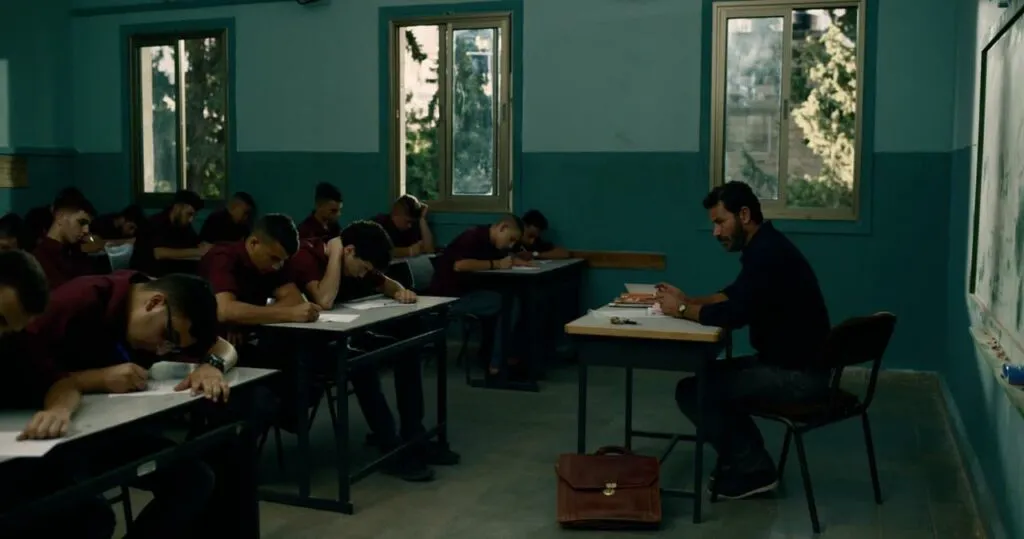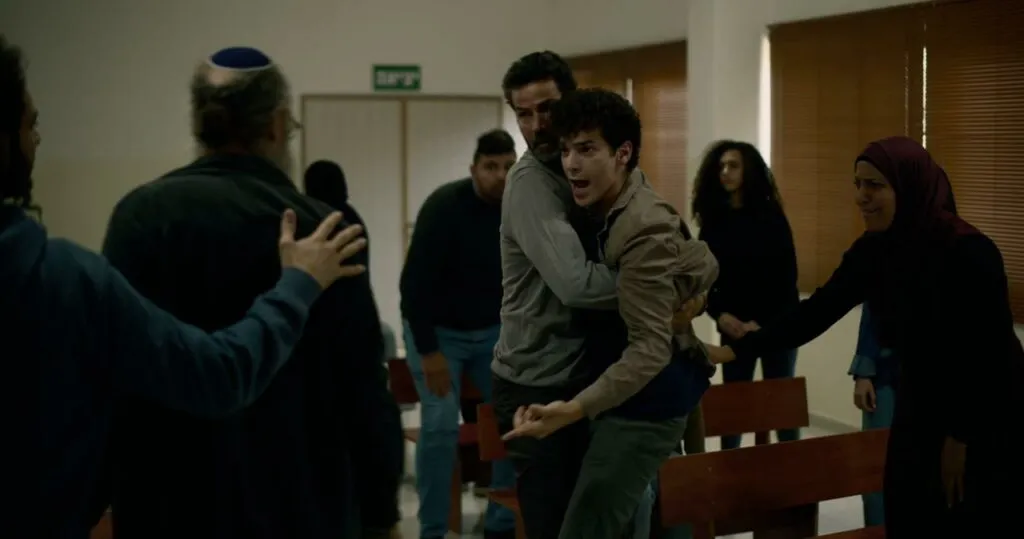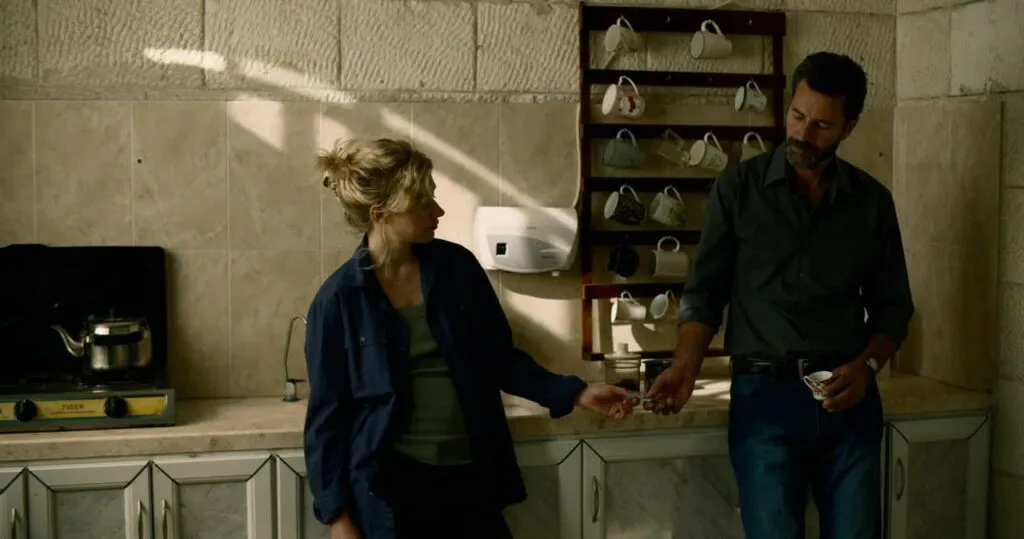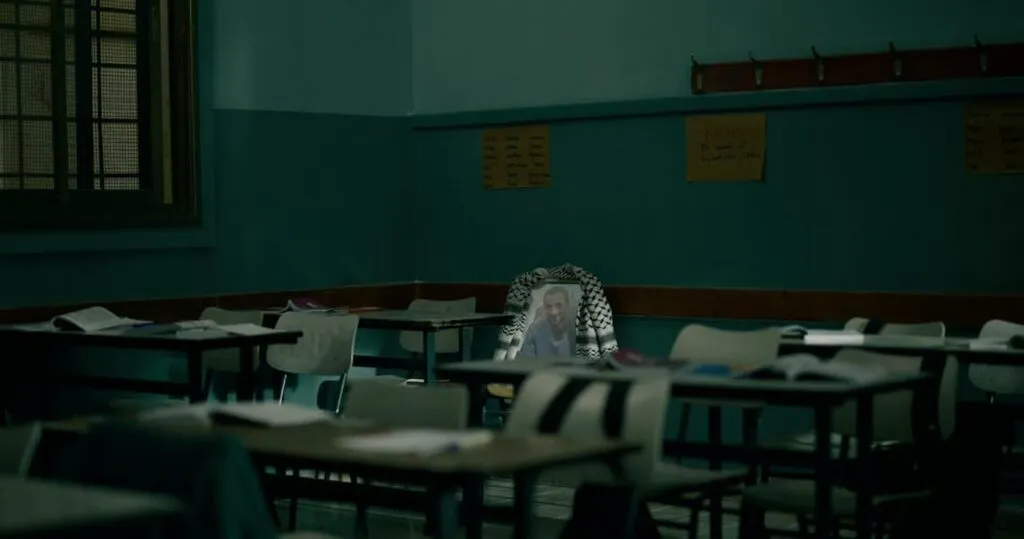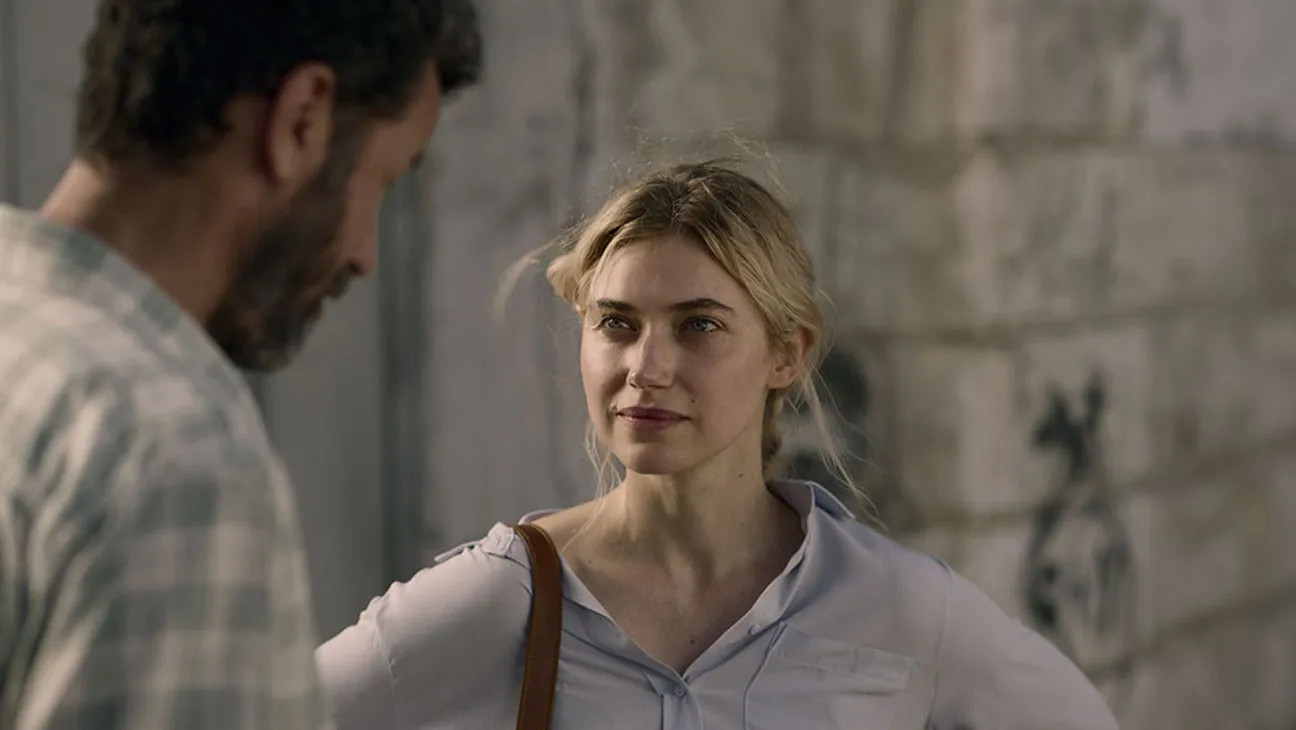Set amidst the landscapes and communities of Palestine’s occupied West Bank, Farah Nabulsi’s feature film debut, “The Teacher” shines a light on the real-life impacts of the ongoing conflict. With Saleh Bakri leading the cast as Basem El Saleh, a dedicated schoolteacher wrestling with his own personal demons, the movie brings us deep inside the world of those living under constant pressures not of their own making.
Basem has chosen the path of nonviolence, yet still carries the scars of actions from earlier days. He forms strong bonds with his students, in particular the brothers Adam and Yacoub. But hopeful youth is all too easily shattered in a place where basic rights are so frequently trampled. When tragedy strikes the boys’ family, long-buried emotions are stirred in both Basem and the grieving Adam.
Threaded through their story is the politically charged case of an Israeli hostage and the massive imbalance in how each society values human life. Basem is drawn back into activism as his community feels the reverberations. Meanwhile, a budding romance offers glimpses of hope amidst the oppression.
Bakri anchors the film with a nuanced, soulful performance, even as the interweaving subplots grow convoluted at times. Flaws in script and direction hold the impact back from what it could be. Yet for all its imperfections, Nabulsi’s debut shines a deserving spotlight on ordinary people rising each day to overcome pressures no community should ever face.
Key Figures in a Conflicted Land
At the center of the narrative stands Basem El Saleh, a dedicated teacher of English who strives to guide his students with patience and care. Yet hints are offered that not long ago, Basem lived a very different life as an impassioned resistance activist. Now divorced and estranged from his past, he endeavors to walk the nonviolent path.
One pupil grasping for direction is Adam, a bright lad contending with deep losses. He and his brother Yacoub have endured the demolition of their family home by Israeli forces as well as Yacoub’s imprisonment. These scars are freshly torn when Yacoub meets a grim end at the hands of a settler, sending Adam toward a darker place. Through it all, caring for Basem remains his rock.
Elsewhere threads of political strife emerge, such as the kidnapping of the young Israeli soldier Nathaniel. His American parents, Simon and Andrea, travel to seek his release, their ordeal increasingly opening Simon’s eyes. As negotiations commence involving hundreds of Palestinian lives, Basem finds himself drawn back to his underground ties.
Caught up too is the newcomer Lisa, a volunteer aide unaware of Basem’s buried history. Her caring yet privileged perspective offers glimpses of hope, though complications arise as truths are revealed.
While early scenes skillfully weave these figures’ fates, later the narrative grows muddied with contrived subplots. Adam and Basem’s profound bond remains the film’s beating heart, a testament to finding purpose amid oppression.
Capturing the Constrained Reality of Life Under Occupation
One of the film’s strengths lies in its vivid setting within the landscapes of Palestine. From the start, Director Farah Nabulsi transports viewers directly into the world that shaped her, with scenes like Basem’s drive taking us from village to the walled boundaries imposed upon the community. Behind the lens, Gilles Porte brings an artist’s eye that ensures both the beauty and bleakness of the locations feel genuine.
Porte’s shots showcase the confined spaces and limited freedoms faced by those in Burin village and across the West Bank. His camera floats among the people, close enough to see life’s small daily struggles. When the demolition of Adam’s home occurs, the swelling clouds of dust and screams of grief are viscerally unsettling.
Yet not all of Nabulsi’s direction feels as seamlessly woven into reality. Some dramatically heightened moments feel contrived, tonally distinct from the everyday challenges otherwise rendered. The climactic scene especially veers toward melodrama through its implausible timing.
Where the film shines most is in humanizing glimpses into life under occupation. Judiciously placed flashbacks unveil Basem’s backstory and how activism remains embedded within him, though buried. These reveal history’s persistent effects on families like his own.
While not perfect, Nabulsi and her team transport us to environments rarely seen through such intimate lenses. Their efforts ensure we cannot look upon the struggles there as mere headlines, but people striving amid imposed constraints.
Resonating Themes of Loss, Resistance and the Human Cost of Conflict
Throughout the film, certain resonating themes emerge, giving insight into how generations have contended with the perpetual strife. Grief and trauma have become an inescapable part of life for those growing up under occupation. With non-violence his guiding light, Basem strives to steer curious minds like Adam’s clear of radicalism, though injustice makes that path difficult.
The film illuminates how the endless “eye for an eye” mentality perpetuates suffering on all sides. In one scene, when Basem tells Lisa about the loss of his own son and of Adam’s recent tragedy, the intergenerational toll of unresolved trauma becomes powerfully clear.
Yet moments also arise showing no group has a monopoly on virtue or vice. The American diplomat Simon comes to see Palestinians not as enemies but as fellow fathers pained by separation from loved ones. Even the stoic Lieberman is granted rare glimpses of doubt—a nuance some characters lack.
Overall, these multi-layered portrayals feel authentic and reflective of humanity’s capacity for both cruelty and compassion, even in protracted conflicts. But occasionally characters verge into caricature, reducing complexity. Still, by prioritizing individuals’ resilience amid strife, the film sparks discussion on nonviolence and humanizing “the other.”.
Through it all, Basem emerges as a compelling symbol of resistance through education and bridging divides, reminding us that freedom must come by peaceful means for freedom to have true meaning. His steadfast example and that of courageous youth like Adam leave viewers with a hopeful vision of a future not defined by endless retaliation alone.
Saleh Bakri: Bringing Humanity to the Fore
Any film lives or dies on the strength of its characters, and in Saleh Bakri’s subtly layered portrayal of Basem, audiences are gifted an anchor keeping “The Teacher” always tethered to truth. Through Bakri’s hands, Basem feels a wholly believable man, worn yet resilient—one finding purpose anew with each student who crosses his story, and in his love kindled with Lisa.
Bakri injects even Basem’s smallest gestures with worn wisdom, from the care taken feeding stray village cats to his patience guiding a grief-stricken Adam. We feel the weariness of one who’s seen hatred do its damage yet retains faith that youth may yet find a gentler path. When past failures resurface, it’s in Bakri’s eyes we see resolves reforged.
Particularly impressive are quiet scenes where Bakri and young talent El Rahman let glances lend their quiet dialogue more depth. El Rahman emerges as a revelation thanks to the ease of rapport between these artists. Likewise with Poots, whose Lisa evolves into more than a mere plot device through Bakri’s nuanced attention.
While others portrayals veer to caricature amid convolutions, Bakri’s steadfast authenticity anchors our care in Basem’s steadfast example. He reminds us that amid life’s hardest trials, our shared humanity remains the greatest well from which hope may drink. Bakri brings this fine story’s heart consistently and compellingly to the fore.
Capturing Place and Pensive Moments
The film comes to life through the technical mastery of its creators. Gillian Porte transports viewers to the dusty streets and landscapes of the West Bank through camerawork that feels intimate yet sweeping. Whether capturing the cramped confines young lives endure or the open vistas now severed from generations past, Porte’s lens honors the setting as more than mere backdrop.
Equally impressive is Alex Baranowski’s somber score. As characters grapple with loss upon loss, Baranowski’s melodies evoke yearning, weariness, and resilience and flow seamlessly with the action. The music enhances pivotal scenes while avoiding melodrama.
However, some directorial choices feel less seamless. The developing romance between Basem and Lisa brings welcome glimpses of tenderness yet remains somewhat disconnected from Basem’s buried personal history and cultural milieu.
And while the film grips through most with its grounded realism, the climax descends into implausible contrivance. A more restrained approach may have driven home its messages more powerfully, as earlier scenes relying on subtlety often resonate longest.
Despite minor flaws, Nabulsi’s debut affirmed the potential of newcomers willing to shine light on silenced stories and forgotten places through technical mastery, serving humanity above all else.
Giving Voice Despite Flaws
Throughout The Teacher, one senses Director Farah Nabulsi’s earnest drive to shed light on stories seldom heard. And for all its imperfections in plotting or pacing, the film carries out that goal through moments of true power.
Saleh Bakri delivers in spades, imbuing Basem with a weariness, care, and resilience that keeps viewers invested in his strivings, as in the lives of students like hopeful Adam. Their finely wrought relationship, showcasing humanity’s capacity for healing even amid constant pressures, remains most poignant.
Less convincing are artworks like an overly melodramatic finale. Yet even here, Nabulsi’s authentic West Bank settings and portrait of crushing injustice via Basem’s and Adam’s perseverance ensure their world stays vivid in memory.
Flaws aside, this debut gives deserved platform to silenced voices and perspectives that are rarely granted attention. The film stays discussion-worthy for prompting reflection on nonviolence and on dismantling structures quashing community spirit. While imperfect, Nabulsi’s work still ignites hope that shared understanding may yet overcome age-old divisions, wherever people find themselves up against walls—seen or unseen.
The Review
The Teacher
Despite uneven storytelling, The Teacher offers a compelling glimpse into life under occupation through well-rendered characters navigating loss with dignity. Saleh Bakri anchors the film with a deeply felt leading performance that makes the film worth watching for his nuanced portrayal alone. While dramatic flaws hold it back, Nabulsi's debut brings an important perspective to light with empathy and reminds viewers of humanity's shared capacity for resilience.
PROS
- Authentic portrayal of the Palestinian setting and people's daily struggles
- Nuanced lead performance by Saleh Bakri that carries emotional weight
- Addresses injustice, nonviolence, and inter-generational trauma of occupation
- Scenes capturing generational loss feel wrenching and impactful.
CONS
- Plot loses coherence with convoluted subplots that detract from focus.
- Overly melodramatic directorial flourishes undermine grounded realism
- The romantic arc feels disconnected and doesn't add meaningful dimension.
- Some supporting roles lack depth compared to lead performances.









































